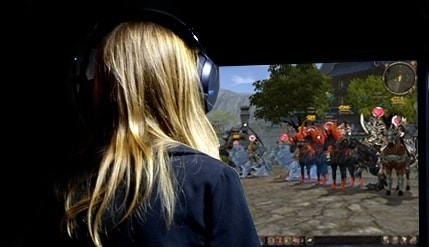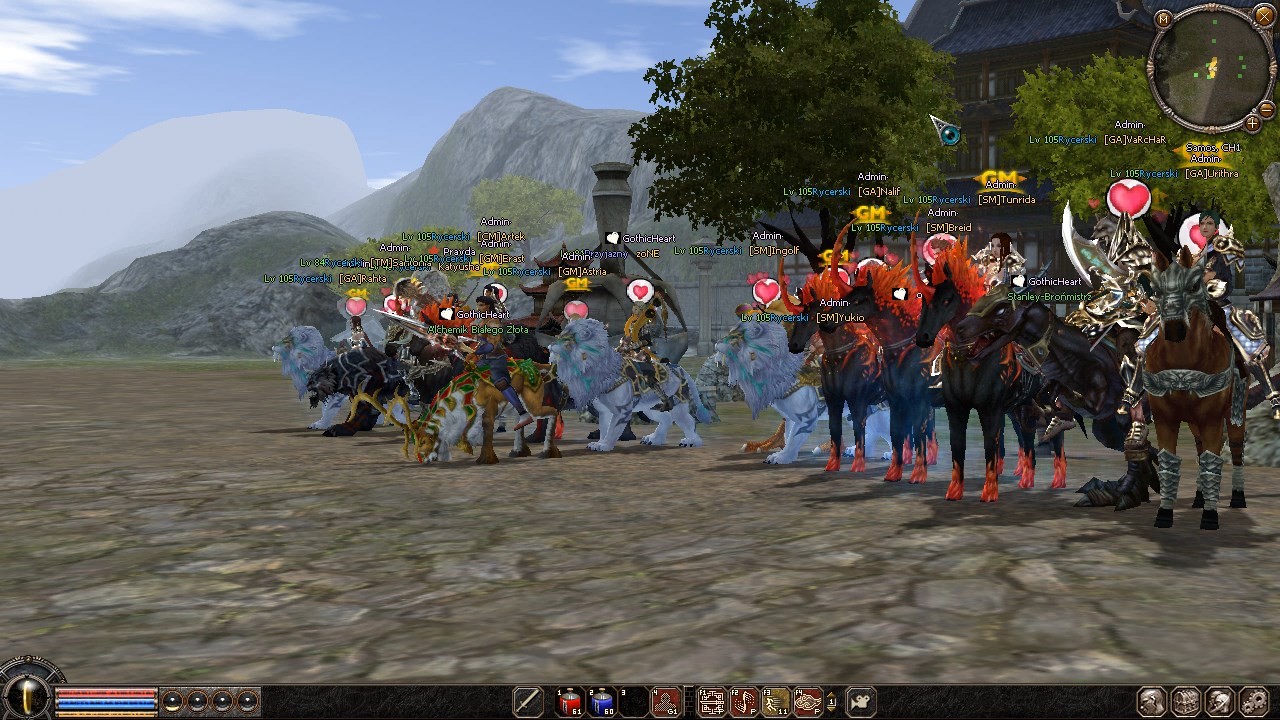MMORPG, Massively multiplayer online role-playing game – it is a kind of game everyone has heard about. These games gather enormous number of people searching for entertainment, meeting new people or even relax. They are often called the most addictive time consumers. Has anyone considered what makes us hold on to them for so many years? What makes us spend each month a significant sum of money and play for even 97% of our time each day (in China even 100 %)? Is it really only an addiction to the game? What do big corporations rely their marketing strategies on to attract, to keep us playing, and convince us to pay for it? Is it always about product features and a good scenario of the game, graphics or the contest? Or something completely different? I will try to explain this to you from the point of view of: a long-term player of these games (11 years’ experience in online games, including 8 years spent playing one game I continue to play), also from the point of view of someone who monitors the market of online games, someone who was fighting for a good place in the rankings., someone who spent a lot of money playing these games. I have also exchanged views with many players and people working in companies editing these games and- what is most important- I have learnt about surveys conducted between Metin2 players. Let me give an example of the abovementioned game in this article, which was once very popular not only in Poland (in case you don’t know it well, I have described the history of this game).
Metin2 – The true story 1999-2015 [DOCUMENTARY] (PL)
Video: Daniel ‘zoNE’ Gabryś
Ways of games distribution
Before we say what attracts and keeps people playing, let us mention how we divide and distinguish among ways of achieving profits from games. Above all, we distinguish among three ways of distribution: F2P, P2P and the less used MMO B2P.
Let me describe each of them F2P, that is free-to-play, it is currently the most common way of online distribution of games. It means distributing games entirely for free . In order to secure incomes covering expenses (servers, which support a game and its service also consume money) the so called Item shop is often introduced under different names. One finds here items available only after payment in a currency of a chosen country. It is aimed at facilitating our contest by developing our equipment to a stronger one or by increasing the amount of experience gained in a game, by accelerating a dimension of characters (as for example in Metin2). Specific projects, as RuneScape give us access to the basic part of the game and they require payment (P2P- pay-to-play in a form of a special subscription for players) to be able to access more advanced tasks (so called “quests”), developed maps/worlds we move in, more advanced features to develop our characters or places meant typically for earning. The few gain money by advertisements and this way offer their products as unpaid, there are unfortunately few like that.
The abovementioned P2P (pay-to-play) differs from F2P as we need to pay a monthly (or covering another period) subscription giving us a possibility to log in (this form becomes increasingly less popular). We gain access to the entire game and all its possibilities without the necessity of covering additional payments. Similarly to F2P, we might have additional payments here in the form of Item Shop or payments for additional locations or extensions, but they are less common.
And the last but not least – the almost forgotten B2P, i.e. buy-to-play. It differs from P2P in a payment which is taken only once – when buying a game. We don’t have to pay for playing in the future. However, just like in other cases, there might appear the Item Shop in a game or additional payments for locations. It is the case of Guild Wars 2.
As you can guess- the biggest number of not advanced players is attracted by the F2P, because it is unpaid service. With an exemption of the game World of Warcraft, which was very popular over the years and it was joining the elements of B2P and P2P (P2P with elements B2P). How do they encourage players to keep playing as well as spending money? The presence of the player himself in the game does not automatically cause income to the author/publisher of the game (indirectly yes, but not directly).
Survey research
In order to formulate an idea about our target group we need to find out who plays these games? What is the average personal profile of players?, How they learn about a game and how much money they spend on it, if any. Let me quote the results of a survey research conducted by Anna „Tujka” Mielec within her research supporting her master’s thesis, conducted and published at the official forum of the game Metin2.pl.
The survey was conducted this year, the research group was constituted of the Metin2.pl players using the official game forum, where the survey was conducted. 154 people took part, and based on it we may draw our conclusion. A vast majority of these people were men- 84%. The leading age group were people between 19 and 24 years old (49%) and 16-18 years old (23%). The oldest person was above 50 years old and the youngest 13-15 years old. This can already cause a sort of shock as the common opinion says the players are mainly around 11 years old. The main source of information about the game indicated by the surveyed were their friends (69%)- which gives us a benchmark, and another one was a family (19%). The time spent playing was 5 years (22%), 7 years (21%), 6 years (18%), 4 years (12 %), 8 years (11%), 3 years (7%), 2 years (3%),one year (3%), less than one year (1%). It shows us that the majority of the surveyed have played for years. To the question „Do you play/have you played at private servers”- often unpaid copies, yet with a smaller number of players, the 58% of the surveyed answered positively- these were people who remained playing the game despite they have used also the offer of the competition. Not less than 52% were people with secondary education, 22%- , 18% higher education. Only 6% of participants played this game together with their children, whose age was determined at 8-12 years (40%). 40 % of the respondents played with their cousins, and 39% with their siblings. Not less than 98% had more than one game account (a peculiar character of this game). 91% of these people communicated through whisper messages (private messages), 45 % through call messages (a general chat for all the players from a chosen kingdom), on the other hand 31% used a standard chat (visible for people standing nearby us) or the guild chat (available only to members of own guild). The choice between a written and spoken form of communication, out of the competition, was divided equally at 50%. The most utilized communicators were the following: forum of the players 49%, Team Speak 47%, Facebook 41%, GaduGadu 39%, Skype 30%, IRC 11%.
Many figures? Possible, but that gives us an idea who actually plays this game. As the survey shows, these are mostly people being19-24 years old, males, high education, singles, playing the same game for 5-7 years despite using products of the competition, which often propose more interesting solutions. They found the game mostly thanks to their friends, they often played with someone from own family, and most of them had more than one account. These people communicated with other players also via other sources of communication such as a game forum, Team Speak, or Facebook/GaduGadu.
What information do we achieve? It shows us these were mainly men without families, who- when starting to play Metin2- were usually within the age group of 12-19, were still students, they knew the offer of the competition (which could be a similar, yet a more simple and upaid game), they had been playing it already for 5-7 years (at 8 years of existence of this game). Why is this exact group most attached to the game?
Sociological approach
From the sociological point of view many aspects can influence this fenomenon. It can be abouta reaisation of primary or higher needs. We can argue about it quoting the Maslov pyramid. The Mmo games are a socialphenomenon, one of social media uniting people and allowing them broad interaction. Thus it allows people fulfilling many needs. Indirectly the gender aspect may influence the intensivity of instincts of a man, which influences directly realisation of our fisiological needs. Virtual world on contrary to real world is enoughpredictable, supervised and rules are clear, thatnks to that people search in MMO an escape from the real world and from the dilemmas of everyday life, which allows to fulfill their need of security. Players realise their need of belonging and often of love by creating virtual communities, establishing contacts, creating groups of players of gildie type or by relations between players. Competing withother players between others through rankings, which is a base of such gams, collaborating in accomplishment of different tasks, gaining new experiences, realising challenges, they gain respect and esteem among game acquaintances they conduct virtual battles with. Basing on the results of these results and cooperation they attain following increasingly more difficult goals, they achieve higher places in rankings, or simply they are memorised by other people. They feel satisfied and accomplished, which is the highest human need in the hierarchy of needs. It is only one of numerous examples showing that MMORPG indeed allow fulfillment of all, even the most important needs.
The same we observe analysing a model of R.A.Webber, who divides needs in internal ones, such as: achievements, compences, self – esteem, prestige, autonomy and the external ones, namely social recognition, love, belonging, security, prestige and power.
Needs are fulfilled also according to ERG model, which divides needs into three spheres: existence, relationship and growth. We can always find in MMO elements, which allow us to fulfill to some extent even our most important needs. That is why these games reproduce real life and they are not deprived of the most elementary factor of that life- other people. Playing these games we often not only transfer our experiences and sensations intothis game, but we also start to act in two alternative worlds distracting at least for a while from difficult and unpredictable reality.
Addictions
Many pople see these relations and not analysing it they describe games as harmful and addictive. It is most supposed about MMO games, which addict not only with its content, but also at the lovel of the relations between players. This opinion is mainly created by the mass media, that phenomenon is new and unknown. Can we equal between an addiction and people, who spend a lot of time at games or just thanks to these games they establish and reinforce already existing contacts or even loves?
I believe it is not that easy and addiction is only for few a reason why they keep playing the game. Of course if we talk about addiction to the same game and not addiction to interpersonal contacts or other aspects developed by the games. Because, as known, people can addict other people by themselves – especially in more intense contact. I know from my own experience that a majority of good players spending much of time and money on games, do not get addicted out of it. Most persons I have met, were able to quit playing instantly without significant reason. I have played at times in various games to get a high position in rankings and in order to be listed at a shortlist of those few people in the country or in the world who were mention by the game administrator at one of the first places from among millions of players based on gained experience or level. Rankings are an indispensable part of games depending on competition, without ranking these games do not exist. I have never had problem with quitting a game any day.
As a matter of fact I have been quitting most of the games plaed for years with no worry about scores gathered, its value, without trading game characters or objects, not trying to regain anything. Even if these accounts in some of the games was reaching sums equalling price of new Lexus at the car showroom. I did not treat that time or mney as a lost one. I played for pleasure (pleasantly spent time with people), not for income. Especially as time spent for baseball one never gets back. If I had spent that time to any other job and money I had spent for it, I would have earned ten times more than that I would get for the account of that game.
Most of people advanced in the ranks have been selling their ccounts, have been searching buyers, but they have been as well finishing their play at oncce. They have not been playing being addicted, but for e – sport, for rivalry, for a place in rankings, for developing human relations. Many have found as well their partner and have developed their real life while playing in internet.
It does not mean the problem of addiction does not exist- it is widespread (especially in Asia, where this problem touches big percentage of the society) and very important.
Interpersonal relations
As Aristoteles stated, a man is a social animal. Interpersonal relations, information exchange, getting acquainted or even development of the emotional sphere are inherent needs of every human being. It is an important ingredient of games. Playing we get nearer or further relations with other peopl, we relate to others, and our game is connecting us to new friendships and even to real life as we invite our friends and family. At last players are not only figures jumping on the screen, butfirst of all people, who are behind them. We get endared to people we talk with. Not rarely we meet in real life with persons met in a virtual one. Artur ‘Art’ Grudziński – Community Manager (guardian) of the games being edited in Poland, one of the biggest distributors, the company Gameforge. All his relation you can hear in an interview, which I have conducted. I attached it below, so you can read it. I mention him, because he operates the biggest network games since years, as well as the person, who – thanks to the community of players – has found good job, which he likes as wellas his love – and no doubt it has affected his current life.
Interview: Interview with Art – the Polish CoMa of Gameforge games (PL)
Video: Daniel ‘zoNE’ Gabryś
What offers us a game? Habits?
Talking with Art about topics connected to within others what keeps people playing net games, he has paid attention to yet another important, but ignored aspect. It matters what the games offer themselves to keep us playing. At the end man does not live only to relate to. If a game does not represent anything beside a possibility to establish contacts, it will quickly evolve into „a chat with possibility to play” (like many Corean games) and not „games with chat optional”. It is already one step to transfer to different sources of communication and so to leave the game.
Issues we mainly pay attention at are: novelties in solutions and technologies, nonlinear and developed story, rich system of persons’ development, rewarded system of achievements, physics of the game reflecting real world and last year- even graphics. We can like it or even hate it, but time passing we get used to it searching similar ones at the competitors. These are the circumstances, which create our habits, which we remember and search for in other productions.
If we spend more time at one title, we do not only get used to it, but we also gain the experience, achievements, new formats of characters. Time not permitting to start the game since the beginning, we stay at the game, where we have some results by now. That is why rankings are so important, that we are able to do despite achieving everything.
So what keeps us playing?
Summarising what causes we start to play MMO games and we keep playing it many factors occur. We should mention pure sociology and human needs, which happen in a virtual world, which each of us tries to fulfill consciously or subconsciously. It is just the fulfillment of these needs leads us to achieving and developing ever newer friendships, which reflect on our virtual and real life. To develop our interpersonal relations, or even to find a loving partner, which starts to have great importance in our future life. We find fulfillment in it, often hobby and even work. They can be a source of our income and even it can sustain our material needs. One has to be as well aware of adictions, which can also influence us (they are not the most present factor as there are not many games, which adict themselves) and adictions from other factors present in net games. There are many aspects connected mainly to abovementioned social, income sphere or adiction to competition. All is completed by our habits and for that a man do not like to change. Getting accustomed to a chosen game, its dynamics, spending longer time with it, not having time to start and develop a new game since the beginning – which takes much time, we simply stay playing the game we know and we have achieved results.
We should remember the game should offer us not only contacts, but also an ability to be played, novelty in solutions, new technologies, story, elaborated system of the developent of characters, prices for following achievements in the game, a system of achievements, often also graphic and physics of the game, reflection of the real world- these are undoubtly issues making the game player to remain. These are not the sole and strong enough forces to keep us for infinite time, because – as we know – after sometime everything gets boring. That is why not one, but more factors that suit a person reflect on how long we keep playing that game. Usually these are abovementioned circumstances, it can be quite individual motives, like in the case of aquaintance, who wrote her PhD disertation based on a chosen game (the survey research quoted in this article has been conducted for the needs of that PhD). Or, like in my case, to be willing to help a community of players and propagating knowledge attached to it. Causes may be different, but the effect always the same. We simply remain with a game for years, we getting attached to it and we do not look at its negative side even if the publisher destroys it with own decisions.
Author: Daniel ‘zoNE’ Gabryś
Translation: Grzegorz Gruener (proofreading: Anna Różalska)













































































